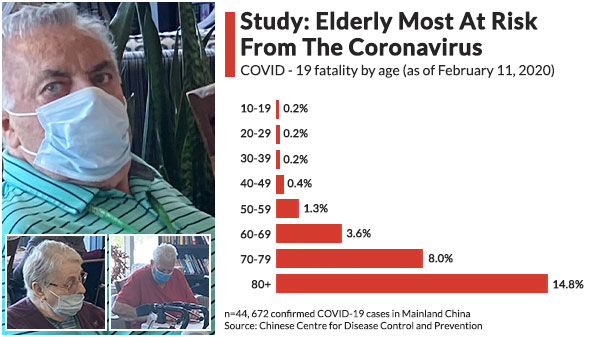COVID-19: Why Seniors Are More at Risk (And How to Reduce It)
As COVID-19 spreads globally, the World Health Organization has acknowledged that the elderly are most at risk, primarily from those already infected. Self-quarantine is the unpleasant best strategy to deal with it. That’s despite the mental toll this increased isolation can take.
Unfortunately, this means that grandparents living alone or in a retirement facility may not be seeing their children or grandchildren in person for several months and will be increasingly alone both physically and emotionally.
Buy, why these extreme measures? And why are older adults at a higher risk of infection? The answer lies in their weakened immune system. Keep reading to find out why the elderly need to be extra mindful these days and what we can all do about it.
How Is Coronavirus Affecting Older Adults?
Everyone is concerned about possible COVID-19 infection. But the stakes are much higher for older adults due to the aging of their immune system, a respiratory system that is less elastic than it used to be and other underlying medical conditions. These are the primary reasons why people over 60 are vulnerable to contracting severe respiratory illnesses caused by COVID-19. Though many cases will be mild and symptoms will be similar to that of the common cold, others run the risk of experiencing severe symptoms. These range from a fever and dry cough to trouble breathing.
It’s a serious health threat which was declared a worldwide pandemic on March 11 by the World Health Organization (WHO) “This is not just a public health crisis, it is a crisis that will touch every sector,” declared Dr. Tedros Adhanom Ghebreyesus, the WHO’s Director General, at a media briefing. “So every sector and every individual must be involved in the fights.”
The WHO’s definition of a pandemic is the global spread of a new disease and is typically applied to new influenza strains.
Karen Hoffmann, an infection preventionist and immediate past president of the Association of Professionals in Infection Control and Epidemiology (APIC), told U.S. News: “The elderly are going to be the ones who become symptomatic.” She also said that older adults with pre-existing conditions such as cardiovascular disease, lung disease, cancer, a transplant history and diabetes are most likely to experience severe symptoms.
The coronavirus causes infections of the throat, nose and lungs that are most commonly spread from infected individuals through:
- Respiratory droplets generated when an infected person sneezes or coughs.
- Touching a surface with the virus on it and then touching one’s eyes, nose or mouth without washing hands.
- Close and prolonged contact such as shaking hands or touching someone who’s been infected.
According to current evidence, it’s understood that the most efficient way for the virus to spread is through close contact.
Our Caregivers Offer Advice on Preventive Measures for Seniors
If you’re living in a retirement home community, some common sense precautions and extra vigilance can reduce your risk of exposure.
Here’s how to protect yourself:
- Observe Social Distancing
If you leave your retirement home facility from time to time, it’s vital to maintain a distance of two metres between you and others.
- Wash Your Hands
Wash your hands frequently. Ideally, take 20 seconds. Regular soap and tap water is adequate. Alternatively, if washing your hands isn’t possible, use hand sanitizer with 60% or more alcohol content.
- Steer Clear of Gatherings
Stay away from any crowded setting or mass gathering, not that they are legal at the moment anyway. This is not just a precautionary but a proactive measure. Everyone is vulnerable so it’s vital that everyone do their part.
- Exercise Respiratory Etiquette
Every time you cough or sneeze, cover your mouth with your inner elbow or use a tissue which you should dispose of in a closed bin immediately after use.
If you notice any symptoms, self-isolate and always wear a mask when venturing out in public. If possible, get others to make these trips for you. This is also a standard in preventing the common cold and flu from spreading.
- Stock Up on Medications and Supplies
Do not hoard essential items, but make sure you have enough everyday household items and groceries. Additionally, stock up on your medications, if you can, to prepare to stay at home for a prolonged period. You can ask your doctor for extra prescriptions to help with this.
- Clean Your Home
Whether you live in your own home or a retirement facility, it is more important than ever to keep your surroundings clean. There are certain ways to get rid of the virus, but it can only be done with appropriate products. Health Canada has published a list of surface disinfectants that can be effective in limiting the transfer of microorganisms.
The current COVID-19 situation is evolving fast. For seniors, it’s important to know that the way the coronavirus presents itself in younger individuals isn’t the same as someone who’s older. For those with older loved ones, if you feel like they aren’t well, don’t dismiss it as a symptom of old age. Now’s the time for everyone to look after each other.


